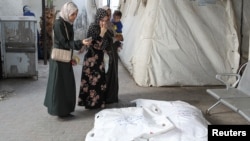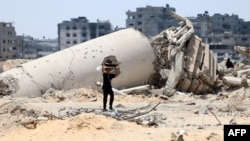Israel and Hamas remained deadlocked Sunday on how to halt nearly seven months of fighting in Gaza that has killed tens of thousands of people and forced more than a million Palestinians from their homes.
After no apparent progress was reported Sunday, the Hamas delegation left the Cairo negations with Qatari and Egyptian mediators to consult with it leadership. It said it planned to return to Cairo on Tuesday.
Earlier, Hamas leader Ismail Haniyeh said that the Palestinian militant group wants a comprehensive cease-fire that would end Israeli "aggression" and guarantee Israel's withdrawal from Gaza, while Hamas frees about 100 hostages in exchange for hundreds of prisoners jailed by Israel.
In a statement, Haniyeh blamed Israeli Prime Minister Benjamin Netanyahu for "the continuation of the aggression and the expansion of the circle of conflict, and sabotaging the efforts made through the mediators and various parties" who have for weeks been unsuccessful in negotiating a cease-fire of any sort.
In Jerusalem, Netanyahu rejected any end to the fighting that would leave Hamas in control of Gaza, the narrow territory along the Mediterranean Sea, and pose a continuing threat to the Jewish state.
Israeli officials did not send negotiators to Cairo to take part in indirect diplomacy.
Netanyahu said that “while Israel has shown willingness, Hamas remains entrenched in its extreme positions, first among them the demand to remove all our forces from the Gaza Strip, end the war, and leave Hamas in power."
"Israel cannot accept that,” he said. "Hamas would be able to achieve its promise of carrying out again and again and again its massacres, rapes and kidnapping."
Netanyahu, who has pushed for a six-week cease-fire and exchange of some hostages for jailed Palestinians, has repeatedly vowed to launch a ground offensive on Rafah, near the Gaza-Egyptian border, to root out four remaining Hamas battalions regardless of whether a cease-fire deal is reached.
The U.S., Israel’s chief arms supplier, has told Netanyahu it is adamantly opposed to a new attack on Rafah, which already has been under an Israeli aerial bombardment.
In Cairo, Palestinian officials said Hamas leaders held a second day of truce talks with Egyptian and Qatari mediators, but there was no apparent progress reported.
One Palestinian official, close to the mediation effort, said the Hamas delegation had arrived in Cairo with a determination to reach a deal, "but not at any price."
Egyptian sources said U.S. Central Intelligence Agency Director William Burns, who has also been involved in previous truce talks, arrived in Cairo on Friday. Washington — which, like other Western powers and Israel, brands Hamas a terrorist group — has urged it to enter a deal.
Israeli media reported that Burns, a main mediator in the talks, would meet with Netanyahu on Monday.
Israel has given preliminary approval to terms that one source said included the return of between 20 and 33 hostages in exchange for the release of hundreds of Palestinian prisoners and a truce of several weeks.
The situation was further inflamed Sunday as Hamas launched 14 rockets from Gaza at the Kerem Shalom border crossing between Israel and Gaza earlier Sunday, killing three Israeli soldiers and wounding a dozen others.
Three of the 12 wounded were in serious condition, the Israeli military told AFP.
The armed wing of Palestinian militant group Hamas claimed responsibility for the rocket attack, which led Israeli authorities to close the crossing, one of the key entry points of aid delivery to Gaza.
The war was triggered by the October 7 Hamas terror attack on southern Israel that killed 1,200 people and led to the capture of about 250 hostages, according to Israeli officials. About 100 of the hostages were freed in a weeklong truce in late November.
Israel’s ensuring counteroffensive in Gaza has killed more than 34,600 Palestinians, about two-thirds of them women and children, according to the Hamas-run health ministry. Israel says the death toll includes thousands of Hamas fighters it has killed.
Months of Israeli attacks have devastated much of the narrow enclave and left tens of thousands of Palestinians famished, even with massive efforts to increase United Nations and Western humanitarian assistance.
As the latest cease-fire talks were underway, residents and health officials said Israeli planes and tanks continued to pound areas across the Palestinian enclave overnight, killing and wounding several people.
Meanwhile, Israel said Hamas attacked the Kerem Shalom crossing point with 10 strikes, forcing it to close. The crossing point has become a primary gateway to get much needed humanitarian aid into Gaza.
Israel gave no details on the source of the assault but said it had come from the direction of the nearby Rafah crossing on the Egyptian border. Hamas said it had targeted Israeli soldiers in the area.
Some material in this report came from Reuters and The Associated Press.















